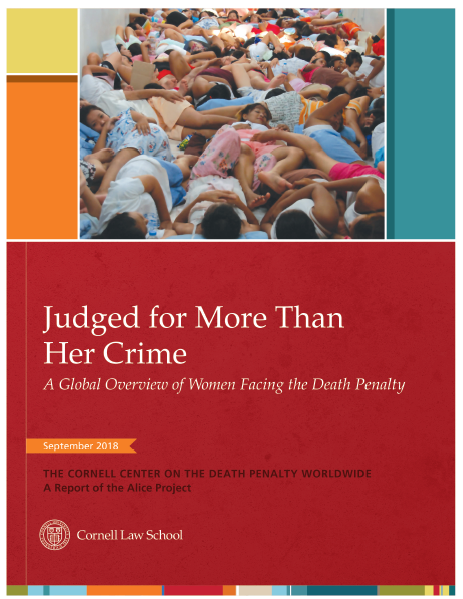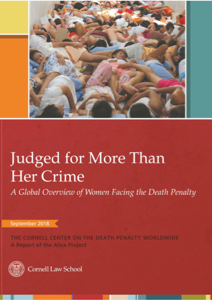Study Documents Injustice and Discrimination Against Women Facing Death Penalty
Geneva, Switzerland; September 18, 2018: Today the Cornell Center on the Death Penalty Worldwide (CDPW) launched its new report, Judged for More Than Her Crime: A Global Overview of Women Facing the Death Penalty, at the United Nations in Geneva, Switzerland. This groundbreaking study is the first to examine how and when women receive death sentences and the conditions under which they are detained on death row. The report documents widespread discriminatory practices in the capital prosecution and detention of women on death row, with particular focus on India, Indonesia, Jordan, Malawi, Pakistan, and the United States.
Although there are at least 500 women on death row worldwide, they have to date remained a largely invisible population, impeding efforts to understand patterns in capital sentencing and the operation of gender bias in the criminal legal system. Most activists have assumed that women benefit from leniency in sentencing, but the authors conclude that women who violate gender stereotypes—for example, women who have multiple lovers, or who kill children—are more likely to receive death sentences. One criminal lawyer from Iran noted that courts trying women in capital cases judge their whole lives, not just the offense for which they are charged.
Moreover, prosecutors and courts have cast women as “femme fatales” or “morally impure” to justify capital sentences. In the case of Brenda Andrews, sentenced to death in the United States, the jury heard details of her alleged extramarital affairs from years before the offense, and the prosecution showed her underwear before the jury during her capital prosecution—allegedly to show that she was not behaving as a grieving widow after the offense. As an appellate judge noted, Brenda was put on trial not only for murder but for being “a bad wife, a bad mother, and a bad woman.”
Female survivors of domestic abuse are particularly vulnerable to unfair sentencing practices in countries that retain the death penalty. Many women on death row have been affected by gender-based violence and socio-economic deprivation. The report describes several cases of women sentenced to death for crimes committed while they were minors, often against older husbands to whom they had been forcibly married as children. These factors receive little to no attention from lawyers and courts. In Malawi, Alice Nungu received a death sentence for killing her husband after he attacked her and her elderly mother in a drunken rage. The court never heard or considered evidence of her abuse in sentencing her to death.
Speaking from Ithaca, New York, Faculty Director Sandra Babcock said, “Hundreds of women have been unjustly sentenced to death around the world, yet their cases have been neglected by activists, scholars, and the international community. We hope that this report will draw attention to their plight and inspire courts and policymakers to modify their sentencing practices.”
Click image for full report:

